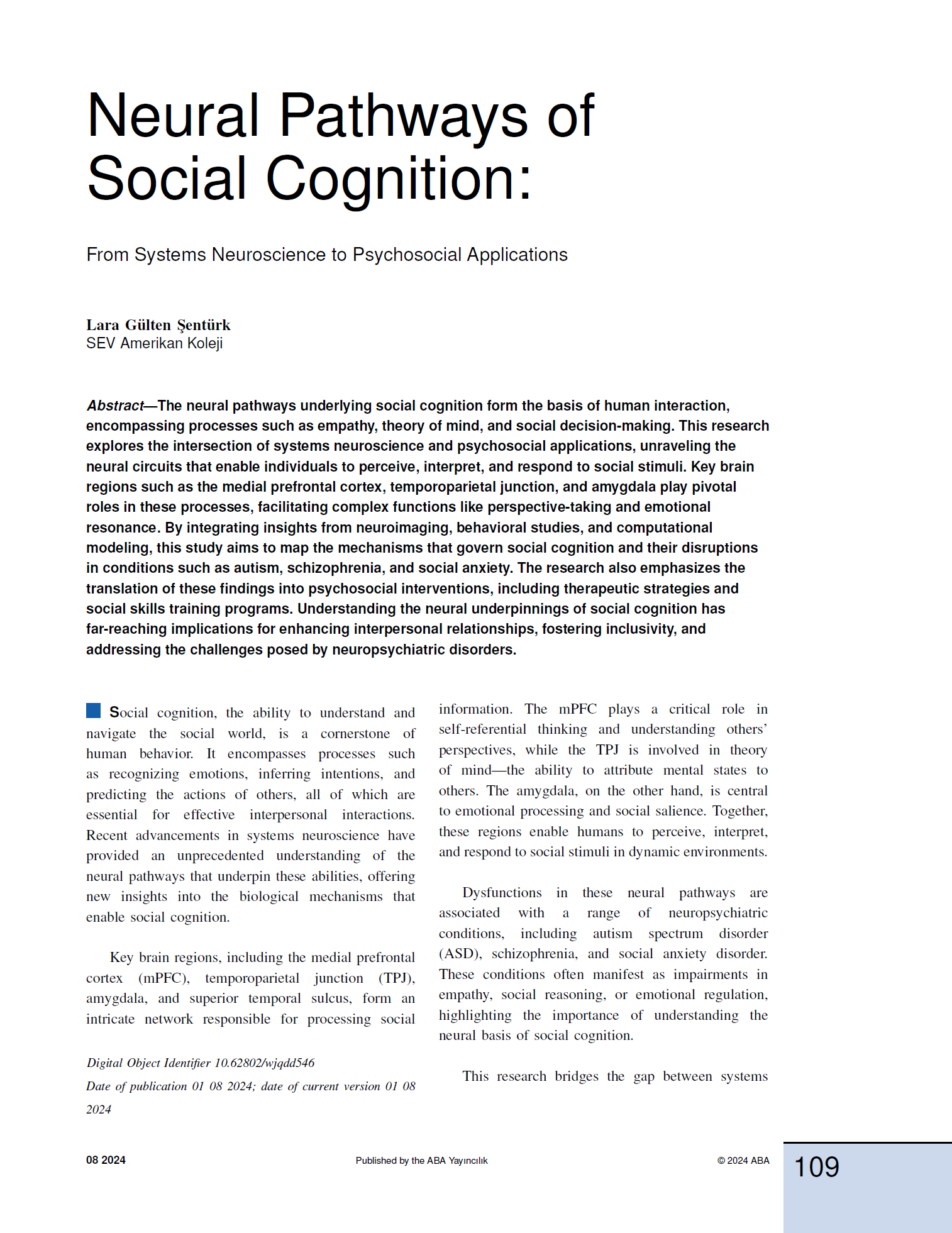Neural Pathways of Social Cognition: From Systems Neuroscience to Psychosocial Applications
DOI:
https://doi.org/10.62802/eeghr198Keywords:
Social cognition, systems neuroscience, medial prefrontal cortex, amygdala, theory of mind, empathy, psychosocial interventions, neuroimaging, autism, social decision-makingAbstract
The neural pathways underlying social cognition form the basis of human interaction, encompassing processes such as empathy, theory of mind, and social decision-making. This research explores the intersection of systems neuroscience and psychosocial applications, unraveling the neural circuits that enable individuals to perceive, interpret, and respond to social stimuli. Key brain regions such as the medial prefrontal cortex, temporoparietal junction, and amygdala play pivotal roles in these processes, facilitating complex functions like perspective-taking and emotional resonance. By integrating insights from neuroimaging, behavioral studies, and computational modeling, this study aims to map the mechanisms that govern social cognition and their disruptions in conditions such as autism, schizophrenia, and social anxiety. The research also emphasizes the translation of these findings into psychosocial interventions, including therapeutic strategies and social skills training programs. Understanding the neural underpinnings of social cognition has far-reaching implications for enhancing interpersonal relationships, fostering inclusivity, and addressing the challenges posed by neuropsychiatric disorders.
References
Basile, G. A., Tatti, E., Bertino, S., Milardi, D., Genovese, G., Bruno, A., ... & Cacciola, A. (2024). Neuroanatomical correlates of peripersonal space: bridging the gap between perception, action, emotion and social cognition. Brain Structure and Function, 1-26.
Denny, B. T., & Ochsner, K. N. 5 Minding the Emotional Thermostat: Integrating Social Cognitive and A ective Neuroscience Evidence to Form a Model of the Cognitive Control of Emotion.
Jamalpour, Z., Khodarahmi, P. A., Jamalpour, H., & Kuzhilnaya, E. (2024). Application of neuroscience and cognitive studies in psychology. Cadernos de Educação Tecnologia e Sociedade, 17(1), 351-359.
Marafioti, G., Cardile, D., Culicetto, L., Quartarone, A., & Lo Buono, V. (2024). The impact of social cognition deficits on quality of life in multiple sclerosis: a scoping review. Brain sciences, 14(7), 691.
Oesch, N. (2024). Social Brain Perspectives on the Social and Evolutionary Neuroscience of Human Language. Brain Sciences, 14(2), 166.
Otared, N., Zafarmand, M., Nweke, G. E., & Chinwendu, N. P. Modern Neuroscience and Psychotherapy: Opportunities for Integration-Review.
Reddy, K. J. (Ed.). (2024). Principles and Clinical Interventions in Social Cognition. IGI Global.
Sievers, B., & Thornton, M. A. (2024). Deep social neuroscience: The promise and peril of using artificial neural networks to study the social brain. Social Cognitive and Affective Neuroscience, 19(1), nsae014.
Singha, R. (2024). Psychosocial Rehabilitation Through Social Cognitive Approaches. In Principles and Clinical Interventions in Social Cognition (pp. 183-203). IGI Global.
Trujillo-Llano, C., Sainz-Ballesteros, A., Suarez-Ardila, F., Gonzalez-Gadea, M. L., Ibáñez, A., Herrera, E., & Baez, S. (2024). Neuroanatomical markers of social cognition in neglected adolescents. Neurobiology of Stress, 31, 100642.









